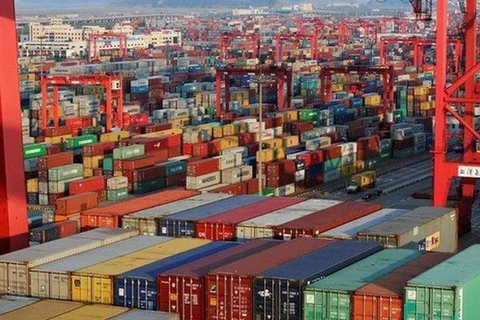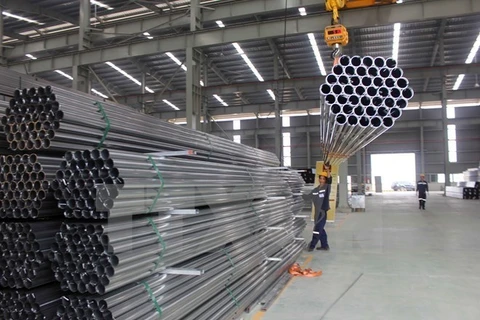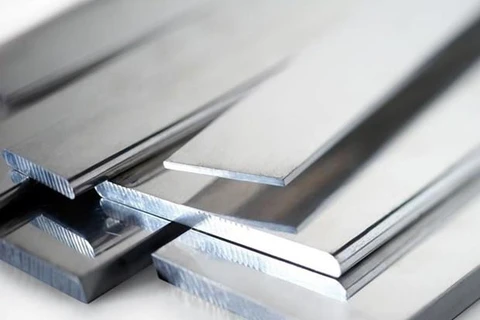Hanoi (VNS/VNA) - Ba Ria-Vung Tau province's Customs Department had seized a suspicious aluminum shipment worth 4.3 billion USD that was heading to the US and other countries, a General Department of Vietnam Customs official said.
This was the largest place-of-origin fraud ever uncovered in the country, according to General Director of the General Department of Vietnam Customs Nguyen Van Can.
Can said the shipment belonged to a corporation which had its own production line but imported aluminum ingots, bars and semi-finished products from abroad to export to the US, among others.
After becoming suspicious, the General Department of Vietnam Customs (GDC) collaborated with the Ministry of Public Security, the Ministry of Industry and Trade, the Vietnam Chamber of Commerce and Industry and other relevant agencies to investigate and block the shipment, he said.
“The Vietnamese customs authority has also worked with US customs officers and the Department of Homeland Security who have sent agents to Vietnam to verify the case,” Can was quoted as saying by laodong.vn.
According to a report of the Ba Ria-Vung Tau province customs, the company's inventory amounted to 1.8 million tonnes worth about 4.3 billion USD.
Trade tensions between the US and China have been ongoing for more than a year. Their impacts, together with temporary trade protection measures around the world such as anti-dumping and countervailing duties, affect trade flows. Some products are being disguised with ‘made in Vietnam’ labels to try to evade US anti-dumping duties.
Vietnam’s aluminum exports to the US were subject to a tax of about 15 percent, but products from China were levied at up to 374 percent, Can said.
According to US customs, even if businesses imported aluminum ingots and bars and finished aluminum products to process, they were still not eligible to be labelled made-in-Vietnam.
Because of the high tax benefit, many businesses in Ba Ria-Vung Tau province had imported billions of US dollars worth of aluminum products, according to Can.
“The customs authority is continuing to fight place-of-origin fraud to stop Vietnam becoming a trans-shipment point for fraudulent goods,” Can said. The authority had also detected and prevented other cases involving importing semi-finished and finished products to Vietnam and faking their origin, he added.
This month, the Trade Remedies Authority under the Ministry of Industry and Trade announced a list of 25 items at risk of trade remedies investigation, an increase of 12 items compared to the list published in August this year.
The list includes hardwood plywood, artificial stone, iron racks, foam cushions, electric bicycles, truck and passenger car tires, and corrosion-resistant steel (2 codes HS), stainless steel rims, hot rolled steel sheets, cast iron products, synthetic fibers, mechanical pipes of steel and cold alloys, aluminum foil, forged steel accessories, common aluminum alloy plates, elastic bands and steel wheels./.
This was the largest place-of-origin fraud ever uncovered in the country, according to General Director of the General Department of Vietnam Customs Nguyen Van Can.
Can said the shipment belonged to a corporation which had its own production line but imported aluminum ingots, bars and semi-finished products from abroad to export to the US, among others.
After becoming suspicious, the General Department of Vietnam Customs (GDC) collaborated with the Ministry of Public Security, the Ministry of Industry and Trade, the Vietnam Chamber of Commerce and Industry and other relevant agencies to investigate and block the shipment, he said.
“The Vietnamese customs authority has also worked with US customs officers and the Department of Homeland Security who have sent agents to Vietnam to verify the case,” Can was quoted as saying by laodong.vn.
According to a report of the Ba Ria-Vung Tau province customs, the company's inventory amounted to 1.8 million tonnes worth about 4.3 billion USD.
Trade tensions between the US and China have been ongoing for more than a year. Their impacts, together with temporary trade protection measures around the world such as anti-dumping and countervailing duties, affect trade flows. Some products are being disguised with ‘made in Vietnam’ labels to try to evade US anti-dumping duties.
Vietnam’s aluminum exports to the US were subject to a tax of about 15 percent, but products from China were levied at up to 374 percent, Can said.
According to US customs, even if businesses imported aluminum ingots and bars and finished aluminum products to process, they were still not eligible to be labelled made-in-Vietnam.
Because of the high tax benefit, many businesses in Ba Ria-Vung Tau province had imported billions of US dollars worth of aluminum products, according to Can.
“The customs authority is continuing to fight place-of-origin fraud to stop Vietnam becoming a trans-shipment point for fraudulent goods,” Can said. The authority had also detected and prevented other cases involving importing semi-finished and finished products to Vietnam and faking their origin, he added.
This month, the Trade Remedies Authority under the Ministry of Industry and Trade announced a list of 25 items at risk of trade remedies investigation, an increase of 12 items compared to the list published in August this year.
The list includes hardwood plywood, artificial stone, iron racks, foam cushions, electric bicycles, truck and passenger car tires, and corrosion-resistant steel (2 codes HS), stainless steel rims, hot rolled steel sheets, cast iron products, synthetic fibers, mechanical pipes of steel and cold alloys, aluminum foil, forged steel accessories, common aluminum alloy plates, elastic bands and steel wheels./.
VNA























